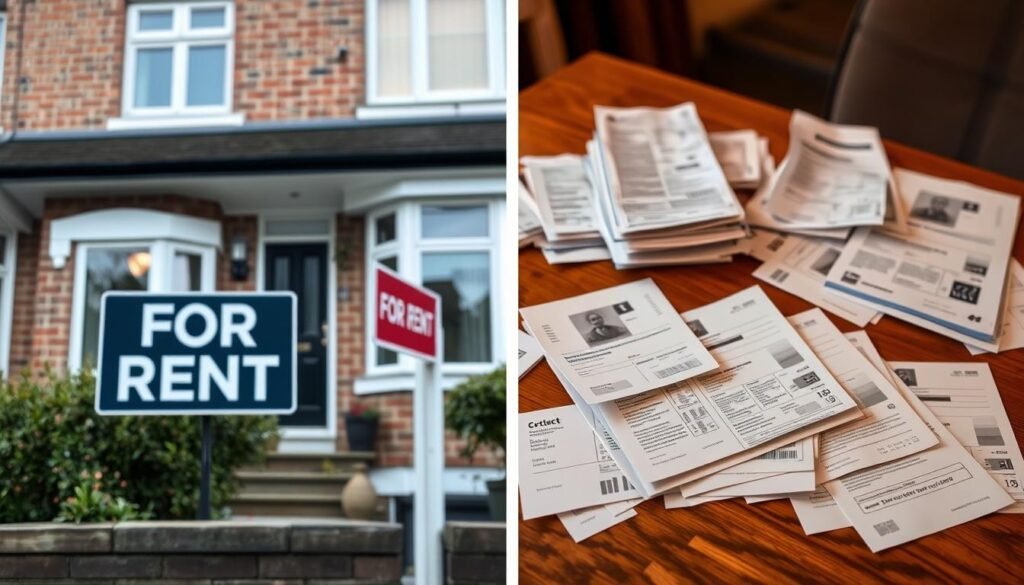Imagine a rental market where utility costs are taken care of for you as a tenant. The question is: Can landlords really afford to include all utility bills in your rent, making life easier for you? With about 75% of tenants preferring all-inclusive rent, it’s easy to see why this is becoming popular. But, as a landlord, you need to think about the balance of duties and financial risks linked to tenant obligations and landlord responsibilities.
There are concerns like tenants using more energy without limits, managing costs well, and making sure bills are paid even if rent is not paid. These issues need your careful thought. Also, the increasing energy costs could affect your rental business profits. But, what about the legal and practical aspects? Do landlords have to charge only the actual utility costs? And how should utility charges be split fairly when there’s one meter for several people?
The debate on whether to offer a bills-inclusive rental agreement is becoming more important as tenancy agreements change. Let’s look into the good and bad sides of including utility costs in your tenancy agreement. This decision is crucial for both landlords and tenants.
Non-inclusive Rent Agreements
Choosing a non-inclusive rent agreement might give you more control over your spending. You’ll also see where your money goes clearly. But, think about how it might change your budget and what you need to do as a landlord. Let’s look at the good and bad sides.
Benefits of Non-inclusive Agreements
Going for a bills exclusive contract makes life easier for landlords with many properties. It means tenants pay for their own gas, electricity, and water bills. This cuts down on the landlord’s work and lets tenants control their spending based on their use.
For landlords, having properties that are empty sometimes can save money. This is true for holiday lets or student rooms that are not used all year.
Risks of Non-inclusive Agreements
Non-inclusive rent agreements have their ups and downs. One big risk is that tenants might not pay their bills on time. This could lead to arguments over bills or even losing services if not sorted out quickly. You might need to step in to help fix these problems or talk about new payment terms.
Also, this type of agreement might not attract as many tenants. Young people, like students or new graduates, might prefer knowing exactly how much they’ll pay each month. So, choosing a bills exclusive contract could mean fewer people want to rent your property, making it harder to keep it filled.

In conclusion, it’s important to weigh the pros and cons of non-inclusive rent agreements. They might make managing your property easier and could help with budgeting. But, you also need to think about what your tenants will have to do and how it might affect who wants to rent from you.
Inclusive Rent Agreements
Inclusive rent agreements are gaining popularity for their ease in managing finances. They combine rent with household bills into one payment. This makes budgeting simpler and more predictable.
Benefits of Inclusive Agreements
All-inclusive rent makes tenant budgeting easier, especially for young tenants and those in HMOs. It helps in planning finances better. Over half of tenants like having utility costs, council tax, and sometimes TV license included in rent.
This approach makes properties more attractive, leading to more tenants and less empty spaces. It also cuts down on the time spent on managing bills.

For landlords, inclusive tenancy means easier payment management and fewer utility bill issues. It also helps in keeping a good relationship with tenants by being clear about costs.
Risks of Inclusive Agreements
Inclusive rent comes with its own set of challenges. Landlords have to manage utility costs carefully due to market price changes. The number of “bills included” listings fell by 90% from January to July 2022, showing the effect of high energy prices.
To avoid issues, landlords can set fair usage policies in contracts. Clear communication about energy use helps prevent misunderstandings. This approach helps avoid disputes and builds trust with tenants.
Under the Consumer Rights Act 2015, landlords can set energy usage limits. They can also adjust rent if utility prices change significantly. This protects their finances from economic changes.
Landlords thinking about all-inclusive rent should plan carefully. This approach can help maintain profits and improve the rental experience for everyone.
Should Landlords Include Bills in the Tenancy?
Deciding whether to include bills in tenancy is not just about money. It’s also about meeting tenant needs and making your property more appealing. Recent changes in laws and government support are key to this choice, especially with rising utility costs and a focus on saving energy.
The UK government has started programs like the £400 grant to help with energy bills. By adding this to rent, landlords can make life easier for tenants. This could make your property more attractive, but it’s important to be clear about any changes in costs.
Adding a fair usage policy to fixed tenancy deals can also protect you as a landlord. It lets tenants know how much they can use utilities, avoiding arguments later. By 2025, all rental properties must meet a minimum energy efficiency standard of ‘C’. This makes now a great time to invest in green upgrades if you’re thinking of covering bills in the rent.
- Increased up-front transparency required by National Trading Standards
- Government rebates used to offset tenant utility bills
- Mandatory energy efficiency ratings influencing rental strategies
Here is a comparative analysis of the expected changes and requisite landlord actions by 2025:
| Regulatory Requirement | Action Required | Deadline |
|---|---|---|
| £400 energy bills rebate implementation | Apply rebate to tenant’s utility bills | Ongoing through 2023 |
| Energy efficiency rating of ‘C’ or above | Upgrade property energy systems | By 2025 |
| Ban on gas boilers in new builds | Install alternative heating solutions | Starts in 2025 |
Adding utility costs to rent can make it more predictable for tenants. It’s a simple way to help them budget better. Make sure all costs and agreements are clear and agreed upon to keep tenants happy and loyal.
Determining Fair Usage Limits
As a landlord, it’s key to set fair usage limits for utilities. This helps manage consumption well and keeps tenants happy. Here’s how to set limits that work for everyone.
What is a fair amount for the usage allowance?
Setting limits for gas, electricity, and water is crucial. It balances your needs with your tenants’ rights. Think about average energy costs and usual consumption for similar places. For example:
- Electricity and gas limits can be £2,184.00 a year for three tenants or £10,192.00 for fourteen.
- Water and sewerage limits are usually 160 cubic meters a year for homes with up to five bedrooms. More rooms get more allowance.
Fair Usage Clause
A fair usage clause can set a yearly energy cost cap, like £3,000. It requires tenants to stay under this limit. Going over might lead to extra charges. These clauses must be clear and fair under the Consumer Rights Act 2015. They help avoid high energy bills and encourage saving energy.
What to do if the tenants regularly exceed the fair usage allowance?
If tenants often use more energy than allowed, talk to them. Explain how their use affects costs and show them the extra charges. Think about teaching them how to save energy or updating lease agreements for regular reviews of usage and costs. This keeps tenants informed and helps them use energy wisely.
Here’s a look at fair usage allowances for Gas and Electricity for different tenant groups:
| Number of Tenants | Annual Fair Usage Allowance (£) |
|---|---|
| 3 | 2,932.29 |
| 4 | 3,909.71 |
| 5 | 4,887.14 |
| 6 | 5,864.57 |
| 7 | 6,842.00 |
| 8 | 7,819.43 |
| 9 | 8,796.86 |
Communicating Expectations Upfront
Starting a tenancy agreement on the right foot is key for both landlords and tenants. It helps avoid disagreements and builds trust. Here’s how to make sure transparency is there and meet your landlord responsibilities while sharing tenant obligations.
Define the Terms Clearly: When you start a rental contract, be clear about what the rent covers. Talk about how utilities, repairs, and maintenance work. This avoids confusion and makes solving problems easier later.
| Statistic | Details |
|---|---|
| Transparency and Tenant Satisfaction | 78% of tenants think clear and open talk is key for a good rental experience. |
| Importance of Timely Repairs | 62% of tenants like landlords who fix things fast, showing the need for quick action on upkeep and repairs. |
| Respecting Privacy | 85% of tenants see respecting privacy as vital for trust. |
| Rental Terms Review | 70% of landlords believe checking rental terms often is important to keep up with market changes and fairness. |
| Conflict Resolution Efficiency | 64% of landlord-tenant disputes can be solved with mediation or help from a neutral person. |
Setting these standards early helps everyone know what to expect. Use different ways to talk, like meetings for a personal touch or emails for records. This makes the tenancy smoother.
Good talk between landlords and tenants makes for a positive relationship. It lowers the chance of mix-ups and keeps both sides happy. Remember, talking well is about sharing info clearly, making it easy to get and understand. Use websites for property management or regular chats to improve your tenant talks.
In conclusion, a strong rental contract is built on being clear, consistent, and transparent. These things are key for following tenant obligations and landlord responsibilities. They also help build trust and work well together during the tenancy.
Targeting Specific Demographics
In today’s rental market, knowing what different groups want can really help. You need to understand the needs of young tenants, like millennials and students. Offering inclusive rent agreements is key. These agreements make paying rent easy by putting all costs into one payment. This is great for tenants who like things simple and clear.
Appealing to Younger Tenants
Millennial renters and young professionals look for easy and budget-friendly options. For them, dealing with many bills on top of rent can be overwhelming, especially for the first time. An all-inclusive rent deal makes your property more appealing. It also makes managing bills easier, which can help avoid payment delays.
Addressing HMOs and Student Lets
HMOs and student accommodation are getting more popular. This gives landlords a chance to attract a lively group of renters. Students and young professionals in these places often don’t want to worry about bills. Offering inclusive rent can meet their needs and make your property stand out in competitive areas.
To keep up with these changing trends, stay alert to what renters want. This way, you can adjust your offers to match their expectations. This helps keep your rentals attractive in a fast-changing market.
Impact of Rising Energy Costs
The surge in energy costs has changed the way tenancy agreements work in the UK. Landlords and tenants must adjust quickly. It’s vital for landlords to balance fair rent increases with the impact on the rental market.
Rising utility bills affect your decisions on rent. With the cost of living going up, tenants want predictable monthly costs that include utilities. But, property owners face financial pressure from these higher energy costs.
| Result of Energy Cost Increase | Percentage of Organizations Affected |
|---|---|
| Tenants Challenging Rent Increases | 26% |
| Organizations Increased Rent/Service Charges | 26% |
| Expected Future Increases | 13% |
| Organizations Using Renewable Energy | 40% |
Higher energy costs have led to rent changes in the market. When you adjust rent for energy costs, be clear about it. Tenants can challenge these increases. Keeping open talks with tenants helps build trust.
Using smart meters can help manage energy better, making things more sustainable for everyone. Pass on any help or schemes like the Energy Bill Support Scheme (EBSS) to tenants as required by law.
- Follow the law when changing tenancy agreements.
- Think about making your property more energy-efficient to cut costs.
- Be clear with your tenants to keep trust.
By carefully balancing these points, you can handle the effects of rising energy bills and living costs. This ensures your rentals stay competitive in a changing market.
Utility Bill Management Services
As a landlord, dealing with utility bills can be a hassle. Utility bill management services offer a way to make this easier. They cover everything from managing bills to helping landlords and tenants. This means you can focus on other important tasks.
These services make dealing with utilities easier for both landlords and tenants. For tenants, they mean having someone to talk to about their bills. For landlords, they help take the stress out of managing bills, making your job easier.
Benefits of Using a Service
Choosing utility bill management services means you don’t have to deal with tricky situations over bills. They act as a fair middleman, making sure everyone follows the rules. This helps keep the relationship between landlords and tenants smooth.
These services also cut down on the work for landlords, especially if you have many properties. You can focus more on growing your business and talking to tenants. Adding tenant services means tenants get quick help, which can make them happier and stay longer.
| Feature | Benefit |
|---|---|
| Consolidated Bill Handling | Reduces time and effort spent on managing individual utility accounts. |
| Direct Tenant Interaction | Lessens the need for landlords to engage in utility-related communications. |
| Dispute Resolution | Handles conflicts regarding utility overuse or payment issues professionally. |
| Enhanced Property Appeal | Makes properties more attractive by offering efficient utility management. |
Using utility bill management services makes your rental business run smoother and more reliably. It’s a smart move for your peace of mind and to keep your properties running well. It simplifies the complex parts of managing properties, benefiting everyone involved.
Conclusion
As a property owner, your tenancy strategy is crucial for success. Deciding between inclusive and non-inclusive tenancy models is complex. It involves balancing tenant needs, costs, and managing utilities. Offering a single rent payment can draw in more tenants by making things simpler for them.
With energy costs on the rise, having a strong utility agreement is key. This helps keep your tenancies stable.
Clear usage rules and historical data can make managing tenancies easier. Inclusive tenancies might bring in more rent and tax perks but can also mean more utility costs. So, it’s important to keep an eye on costs and talk openly with tenants. This helps keep cash flow positive and reduces environmental impact from higher usage.
For non-inclusive agreements, think about billing tenants directly or offering a utility allowance. This can help manage costs better.
The choice to bundle utilities with rent depends on your property, tenant likes, and the law, like the Tenant Fees Bill. It’s important to follow the law to avoid fines and keep your tenancy agreements strong. A custom approach that’s clear with tenants and fits your financial goals is best. Tailoring your rentals to these points will help you have a successful tenancy that meets today’s renter needs.




